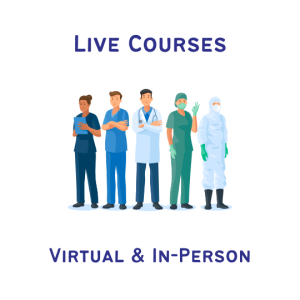
Published November 11, 2025 | Updated November 17, 2025
By MedCourse
Useful, relevant, and interesting content for UK Junior Doctors.
About the Author

Dr Rebecca (Becky) Richardson, Internal Medicine Trainee Year 2, East Midlands
My interest in Medical Education began when I embarked on a project to turn my medical school notes into two colourful and concise revision textbooks for those following in my footsteps. I spent two years working hard on this alongside my job as a Foundation Trainee.
After I finished F2, I was excited to turn my passion for Medical Education into a more central part of my job by working as a Teaching Fellow. Alongside this, I am also completing a PGCert in Medical Education to delve deeper into this hugely fascinating and important subject area.
Courses & Conferences to Attend
- Teach the Teacher Course – There are plenty of these available, run by different organisations. They are usually one or two days long and give a basic overview of Teaching and Learning Principles. They are a good way to show commitment to medical education, as well as being interesting and useful at the same time!
- I personally didn’t complete any other specific teaching courses or conferences, as teaching experience is much more important when it comes to applications (more on this later)!
As above, a Teach the Teacher Course is a really good place to start, without being too much time alongside a busy full-time job as a Junior Doctor, or too expensive (usually covered by a study budget).
If you are applying for the role as a more senior doctor, you may have had time to study for a PGCert in Medical Education. This would look absolutely fantastic when applying for Teaching Fellow Jobs, as some also allow you to apply for Fellowship of the Academy of Medical Educators. However, be aware that it is a big commitment (of time and money).
How to Maximise Your Portfolio
Like all applications, being a Clinical Teaching Fellow requires the same core attributes and skills that are valued throughout medicine. These include leadership, teamwork, clinical competence, quality improvement/research, and teaching. Of course, for a Teaching Fellow job, there will be extra emphasis on the teaching part!
My advice would be the same if you were applying for any other specialty – try and get involved in projects/activities/teams where you can develop all of the above skills. An example of leadership could be being on the Doctor’s Mess Committee, which also demonstrates communication and teamwork. However, don’t just limit yourself to medical roles. Many of these skills can also be evidenced by activities outside of work, e.g., captaining a sports team.
Being involved in a quality improvement project is a necessary part of Foundation Training, but if you can put a little extra effort in and take your project to the next stage by presenting it at a local, regional, or even National Conference, then this will also stand out and show you to be a conscientious and hardworking individual. Quality Improvement and research are just as important in Medical Education as in our clinical work, and if you can be involved in a project related to Med Ed, then that will look even better when applying for a Teaching post.
As far as Teaching is concerned, all experience is good experience. However, my advice is to try and focus on one bigger, ongoing project, rather than lots of small ad hoc ones. By this, I mean getting involved in delivering a series of related sessions over a few months (most applications want a minimum of 3 months to score top points). You don’t have to do this by yourself! Find some friends to help you, or just ask to get involved in a teaching programme that is already up and running – this is even easier now through the use of online platforms like Zoom, meaning teaching can be arranged and delivered worldwide from the comfort of your own bedroom!
Making the Most of Your Day Job
Of course, to be able to teach others, you need to be comfortable with what you are teaching yourself. See every day as a learning opportunity to expand and consolidate your own clinical knowledge, so that you will be able to come across as a competent and skilled teacher. Volunteer to step up as a leader where you have a chance to do so – this is a valuable skill for being a doctor, but also when teaching others, and as a junior, there are often fewer opportunities to practise it. And of course, if there are teaching opportunities, take those as well. Even informal chats with medical students at the back of ward rounds to help explain a concept will help you to develop the communication skills that are vitally important for teaching.
Making the Most of Clinical Teaching Fellow Post Placements
You obviously don’t get a whole rotation in ‘teaching’ as a Foundation Doctor, but instead it can be experienced throughout any rotation. My advice is to talk to others in the role of a Teaching Fellow – see what their job looks like and find out what they like and dislike about it. Take the opportunity to try teaching students on the ward and find out if you enjoy this. If you do, take any opportunity you can to practise your teaching skills and bank experiences that you can talk about at the interview, both good and bad.
What About Non-Clinical Teaching Fellow Post Placements?
As above, teaching and education are everywhere in medicine! Keep your eyes and ears open to opportunities, and if you can’t spot anything obvious, don’t hesitate to make a few enquiries…













